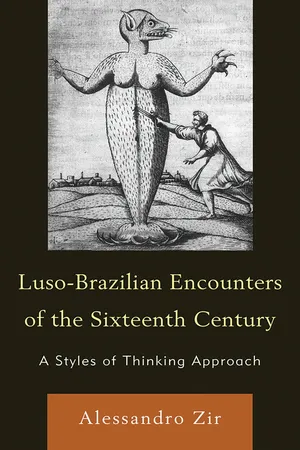
eBook - ePub
Luso-Brazilian Encounters of the Sixteenth Century
A Styles of Thinking Approach
- English
- ePUB (mobile friendly)
- Available on iOS & Android
eBook - ePub
About this book
As it happens with other early-Modern corpora, the descriptive texts from 16th-century encounters of the Portuguese colonizers in Brazil are well-known for their strangeness. In them we find references to entities like monsters and demons, bizarre descriptions, and odd classification systems of plants and animals. For the most part, these elements are dismissed as mere eccentricities by modern scholars studying these texts. Instead, this book takes these elements seriously. They are focused on and tackled with a theoretical tool_styles of thinking_not yet used in Luso-Brazilian studies, and coming from another field of inquiry: philosophy and history of science. By doing so the book aims to unveil epistemological and ontological issues in which colonial and post-colonial studies are entangled, and which have a relevance that goes beyond debates concerning, for instance, the formation of Brazil's cultural identity. This book contributes to Luso-Brazilian studies, science studies, and the history of the early-modern period. The notion of 'styles of thinking' as presented and used in it benefitted from the many discussions about philosophy and history of science that emerged since the 1980s, with authors such as Ian Hacking, Lorraine Daston, and Peter Galison, who have already done much reassessing critically what is best in the work of previous authors such as Paul Feyerabend, Thomas Kuhn, and Michel Foucault. This book considers that the well-known puzzling passages of the corpus of the Portuguese have a fictional and figurative character that acquires full intelligibility in view of literary and mystical traditions typical of the late Renaissance, and influential over the Portuguese. Nature is understood as emerging from an excessive source which permanently overflows it and which is impossible to refer and depict literally. The book points to the fact that such an idea would connect the Portuguese with other peculiar pre-Modern and post-Modern authors with similar ontological insights: from the neo-Platonists to Boccaccio, Nietzsche, and more recently, Derrida.
Frequently asked questions
Yes, you can cancel anytime from the Subscription tab in your account settings on the Perlego website. Your subscription will stay active until the end of your current billing period. Learn how to cancel your subscription.
No, books cannot be downloaded as external files, such as PDFs, for use outside of Perlego. However, you can download books within the Perlego app for offline reading on mobile or tablet. Learn more here.
Perlego offers two plans: Essential and Complete
- Essential is ideal for learners and professionals who enjoy exploring a wide range of subjects. Access the Essential Library with 800,000+ trusted titles and best-sellers across business, personal growth, and the humanities. Includes unlimited reading time and Standard Read Aloud voice.
- Complete: Perfect for advanced learners and researchers needing full, unrestricted access. Unlock 1.4M+ books across hundreds of subjects, including academic and specialized titles. The Complete Plan also includes advanced features like Premium Read Aloud and Research Assistant.
We are an online textbook subscription service, where you can get access to an entire online library for less than the price of a single book per month. With over 1 million books across 1000+ topics, we’ve got you covered! Learn more here.
Look out for the read-aloud symbol on your next book to see if you can listen to it. The read-aloud tool reads text aloud for you, highlighting the text as it is being read. You can pause it, speed it up and slow it down. Learn more here.
Yes! You can use the Perlego app on both iOS or Android devices to read anytime, anywhere — even offline. Perfect for commutes or when you’re on the go.
Please note we cannot support devices running on iOS 13 and Android 7 or earlier. Learn more about using the app.
Please note we cannot support devices running on iOS 13 and Android 7 or earlier. Learn more about using the app.
Yes, you can access Luso-Brazilian Encounters of the Sixteenth Century by Alessandro Zir in PDF and/or ePUB format, as well as other popular books in History & Literary Essays. We have over one million books available in our catalogue for you to explore.
Information
Table of contents
- Acknowledgments
- Introduction
- 1 Styles of Thinking
- 2 Neo-Platonism in the Early-Modern Period
- 3 The Sixteenth-Century Corpus of the Portuguese Colonizers of Brazil: Ontological Issues
- 4 The Sixteenth-Century Corpus of the Portuguese Colonizers of Brazil: Three Methodological Strategies
- Conclusion
- Notes
- Bibliography
- About the Author